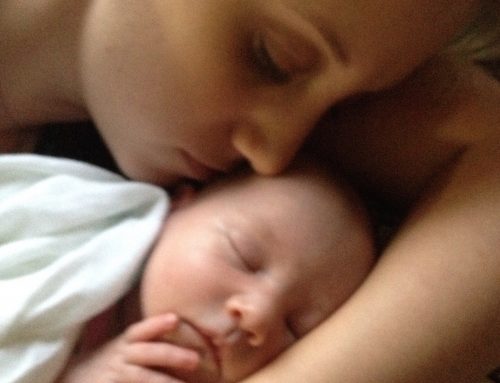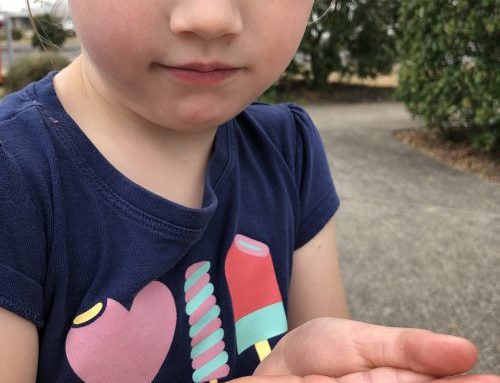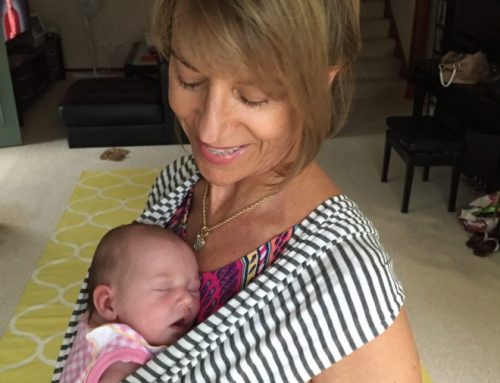There is a growing group of mothers that are really enthusiastic about this approach to feeding their baby solids. The theory is that at six months or so the baby starts to put everything she can get her hands on into her mouth She uses this new developmental step to explore the world, not only with sight and touch, but also the added dimension of taste and the experience of what things feel like in the mouth. Actually this attribute is a good reason to try and dispense (kindly and humanely!) with the dummy before this tendency arrives. Having a plug in the main sensory organ for this, really interferes with its expression!
So babies pick things up and put them in their mouths. So let’s make it food! We give them food that little hands can grasp like small pieces of apple or carrot, or mush like pasta, and transfer into the mouth and consume. Bingo! A self feeding baby. Mother can sit back and eat her own dinner in peace.
Well, quite. This method is said by its fans to lead to babies that regulate their appetites better so have less chance of becoming obese later. They also believe that the babies get into and enjoy a greater variety of ‘difficult’ foods such a broccoli and, interestingly, they innately tend to avoid foods to which they are (or will become) allergic.
Doesn’t that tick all the boxes for you!
That is not to say that it’s all rubbish. One part that I really agree with is letting the baby decide how much she wants to eat, rather than have the mother decide for her. It sure works with breastfeeding in which Mum has very little say (and in fact barely knows) about the volume of milk the baby gets. This is probably one of the more important reasons why breastfed babies tend to get less obesity and overweight later.
So if the baby can really regulate her intake once she starts solids then it follows this would be something to really encourage.
For some babies the process works well. The little one figures it out and, though there can be a fearful amount of mess, she needs very little help to get enough to satisfy herself (and hopefully her mother). That is as long as mama is patient and recognises that large amounts of food are not actually necessary in the early months after solids introduction.
Many babies however are less competent at the transferral of food into mouth (and down the throat). Just as some babies walk at a year of age and some take their time until eighteen months, so with self-feeding. Also quite a few mothers find the process too challenging, both in time spent cleaning up and watching anxiously to see how much ends up inside the baby, and how much ends up on the floor, in the hair or on the cat. And with these baby meals, don’t be in a hurry. They can take hours!
Some mothers are also anxious about the baby inhaling and choking on the food. This bit is clear: there is no need to worry. As mentioned elsewhere, babies have an incredible ability to protect their airway and they will not allow food (or even fluids for that matter) to go down the wrong tube. It is still important however to make sure the food you give your baby is not crumbly, or the pieces of food are not too hard to mash with the gums.
The proponents suggest that if one feeds the baby conventionally by spoon that they come to rely on that and lag behind others in the ability to feed themselves later. In essence this is probably true as practice does make perfect, but we’re talking only a few months. Does this actually matter?
By 10 months most babies want to start feeding themselves anyway, and, indeed, can get quite pushy about it. Sometimes they will start refusing food from the spoon and insist on doing it themselves.
Relaxation around food and its consumption is most important. Food is to be eaten in a cloud of love and contentment. It’s neither a task nor a competition!









Hi Dr Cilton, I love your new book and refer to it often. I am curious to know how much food per day should be fed to a baby in the 4-6 month stage, considering their digestive system is still developing. My 5 month old eats a good few tablespoons of vegetables and cries for more … How much is enough for now considering this is about the joy of food? And he still has five breastfeed a a day?
Thank you
Sarah
His digestive system will tell him how much food to eat. Generally you should offer him a variety of good quality foods and let him decide.
“Food is to be eaten in a cloud of love and contentment.” how poetic. This is my new motto. Every thing baby will be done in a cloud of love. Thanks.
Amongst the potential for mental chaos with all the ‘good advice’ out there, your books keep me calm by bringing it all back to basics and intuition. Which nicely leads to a calm household.
I’m on baby 2. Breastfed except 1 night time bottle by dad for some valuable rest for me. It was fashionable during my first baby to introduce solids at 6 months. Now seems its 4 months. The age baby 2 is now.
Your book makes reference to it being nice if breastfed babies can be spun out to 6 months if they can. I currently can hold off.
I’m curious what the benefits are of sticking with only breastfeeding until 6 months? Knowing this might help me decide which way to go on the issue.
Thanks in advance.
Only that exclusive breastfeeding is all a baby needs (nutritionally and emotionally) until 6 months. After that they need extra iron in particular. The four month recommendation is not firm, it’s just that some babies get keen on the idea at that time.